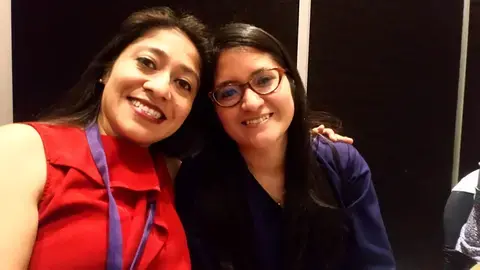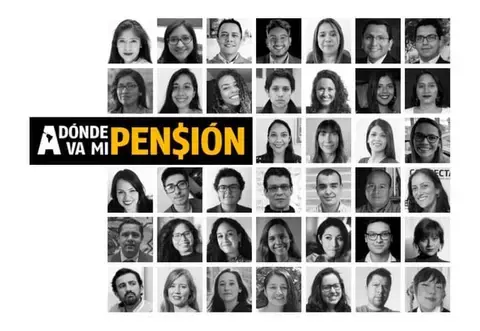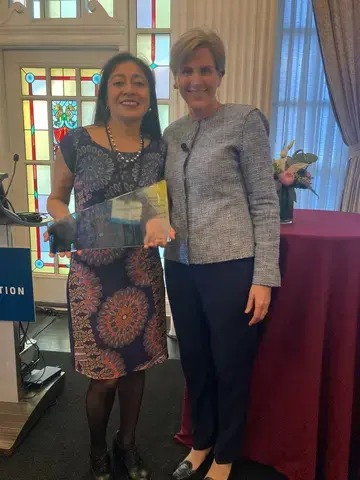
A team of Latin American journalists from nine countries who produced the collaborative investigation Where Is My Pension? has won the prestigious TRACE Prize for Investigative Reporting. Led by Lilia Saúl Rodríguez from Mexico and Luisa García Tellez from Peru, the investigation worked across the region to analyze data from around 500 billion dollars of pension funds to provide citizens with a tool to determine where, exactly, their pay is being invested.
Their discoveries were worth the effort: Workers can now trace a portion of their wages directly to investment in public debt, corporations with labor violations, environmental crimes, corruption charges, and companies owned by the pension fund investment regulators themselves. The investigation also sheds light on the issue of freedom of information in Mexico, Uruguay, and Panama, where pension regulators refused to turn over data. In Mexico, the team started the process to access data almost three years ago, and is still waiting for the state to comply.
The TRACE Foundation is a non-profit organization established to support projects that encourage greater commercial transparency. The annual prize recognizes the most outstanding global stories uncovering bribery and financial crime, with an award of $10,000. Rodríguez accepted the prize at the award ceremony on June 23.
Tellez also was the Pulitzer Center’s 2022 Breakthrough Award runner-up for her work on this project. Award judge Rhitu Chatterjee commended Tellez on “her ability to bring together and co-lead a big team of journalists, web designers, and economists to pull this big project off so successfully, as well as the tremendous impact of this work.”
In an interview with Pulitzer Center Editorial Intern Grace Jensen, Rodríguez and Tellez discussed Where Is My Pension?, the challenges of investigative journalism, how to work collaboratively across borders, and what they see as the future of the project.
This interview was translated from Spanish and edited for length and clarity.
Grace Jensen: How did you realize that pensions might not be going to the places that people would expect, and that this was an issue that you wanted to investigate?
Lilia Saúl Rodríguez: Well, it was a concern of both Luisa and myself seeing that we are still in a time when we lack the means to put pressure on them, [and] at the same time we see that our families, or the people we know in our countries, live with very low salaries that are neither dignified nor fair. We also saw that there were already social movements in the making, such as in Chile, precisely because of the dissatisfaction with the issue of pensions. Since it is a somewhat sophisticated issue for the average person to understand because it has to do a lot with investment funds, I believe that this was something that both Luisa and I could contribute: that time of investigating beyond what they show the pensioners on their statements.
Luisa García Tellez: We saw the bad results in Chile. We asked ourselves: Why have they lowered the pensions? And what is being done with that money? We realized that there is a lot of money; it accumulates a lot, especially in a country like Mexico, the country that right now has the largest amount of accumulated retirement funds. So we are always wondering about the path of money and these issues in journalism. In this case it was even more important because it is everyone's money, the small properties of all of us.
GJ: How did you decide to work as a team of journalists across borders in nine countries? At the beginning, did you think that this would be possible?
LGT: Ignorance is bliss. But yes, I always had it in my mind that the system we had in Peru was not only in Chile, but in more countries, because when I was getting statistics to compare Peru with other countries, I saw a source that said that this system was in nine countries. I commented this to Lilia, and we enthusiastically said, "Then we have to do it in nine countries." And so we put together the team a few at a time. First, we put together a team in four or five countries, and with that team we applied for the first grant, which was from COLPIN, the Latin American Conference of Investigative Journalism, at the end of 2019. We won and decided to expand to the nine countries that the project originally had. After about half a year of working, we decided to apply for the Pulitzer Center grant, which was a great help. It made all the difference because we already had a project that was very ambitious and with very little funding. So that's more than a relief; it was already a lot of stress. That's how we looked for a way to make it viable.
LSR: I had seen how it was possible to work in large teams in different countries with previous experiences. As long as there is coordination or a common concept, which is to seek the same objective for the research, I believe that this type of work can be achieved. And of course, as Luisa says, after obtaining the two grants, I think it was an incentive to be able to carry out the project at the web and multimedia development level, which is something that was also required due to the complexity and the amount of inputs we had.
LGT: Between Lilia and I, we spoke many times of our passion and a bit of madness [for this project]. But one goes in with a lot of affection for the project, and keeps going, keeps going, keeps going.

GJ: What was the biggest challenge in your investigations? And what was the most surprising finding to you?
LGT: As this happened in different countries, I think that the biggest challenge with the project was the expense, because this is an independent project. It is not as if we had a media outlet behind us that would support us economically. So it was that part with just the two of us working, looking for funds.
A second challenge is to coordinate so many people and to be able to keep it on the same publication date. There was a lot of camaraderie from everybody, because some of them had already finished their reports, others had not yet finished, but they all waited for the deadline to be able to do it.
And the greatest discovery is to be able to tell people where their money is invested. Companies that, had [the people] had the decision whether or not to invest in them, most likely would not. Companies that violate environmental regulations, that do not respect labor rights because they are investigated for corruption, or that belong to the same economic group of the private administrators. And to also give [the people] the possibility to do their own searches with the tool.
LSR: And I would only add that one of the challenges also, which I think even before the economic one, was that just when we started with the project, the pandemic broke out.
For several months, even though we had already started the project, it had to stop for a while, precisely because everyone started to lock themselves in their homes. At the same time, it helped in a certain way that many people who no longer went out to the street to report could do so from their homes because there was a lot of data to analyze. This allowed us to sit down a little bit more to reflect or analyze the data that we had already obtained.
LGT: I think that one last challenge was that we worked on a second tool that had to do directly with the issue of pension levels, a calculator that has very complex mathematical formulas behind it. But because of the fact that we already had to publish that part of the project, we did not manage to build it in time. And it was difficult to decide to publish [the project without the tool]. But I think it was the best decision to be able to close this phase.
GJ: In Mexico specifically, what do you think has to change in the journalistic environment in order to have the transparency needed for this project?
LSR: It is a matter of confidentiality. In fact, one of the achievements that was obtained through the requests for information and by Luisa's insistence, then by my own, and later helped by a lawyer who has to do with access to information issues, that we had the right to know where these pension funds are being invested and, unfortunately, to date, all the AFORES [Retirement Fund Administrators] in Mexico continue to fail to comply. Currently, the only thing that continues to exist is a constant coming and going of legal documents from the Courts in which the AFORES continue to take legal protection in order not to deliver this information. How far will it go? We do not know, but in this case we do have the support of the lawyers, including the Transparency Institute. This case could go all the way to the supreme court, which is the highest authority, to force them to open the information.
LGT: This same information is totally freely accessible in other countries. There is no technical argument for them to deny the opening of the information and that is why we are seeking with great conviction to open the information because it is exactly the same data that is fully accessible in Peru, Chile, Costa Rica, and the Dominican Republic.
LSR: It has to do with many years of this opacity to which they were accustomed, precisely not only the government sectors, but also the private sector. I could even say that a little of what has changed in recent years with the six-year term of Andrés Manuel López Obrador's government has to do with the fact that, at least on the government side, they have been trying to make many dark sides of the financial sector and the private sector transparent, so to speak. However, as far as the issue of access to information is concerned, we, at least the journalists, have observed a setback in terms of the information held by the Mexican government. So, it may have to do with the context of access to information, the context we are currently living in this Mexico, ruled by a government that has not been very much in favor of transparency and much less of journalism and journalistic investigations. But we hope that at least on the part of the authorities in charge of legislating and overseeing compliance with the laws that have to do with the judiciary, we hope that we can see a light on the road, even if it is a very long road.
GJ: What has changed in these countries since you have published the investigation? What responses or reactions has the story provoked?
LGT: Well, in Mexico I think it serves to open the discussion and make the problem visible. In the case of Peru, this is a bit technical, but the workers, apart from paying a commission to the private pension administrators, pay other commissions to administrators that are outsourced, but these commissions are not transparent. Until the publication of the project, they did not know that there were other commissions that they also paid, and they are high, millionaire commissions. At least what we have managed to learn is that the whole amount was paid by all Peruvian workers. The same association of private administrators accepted that it is important to make these commissions transparent, and that they would even be willing to respect or discuss and in case it is approved to respect limits or ceilings to these outsourced administrator commissions, something that is already happening in Chile. In Chile, for example, the discussion was reopened on companies that violate environmental regulations and that receive investment from pension funds.
But where it has had a great impact on the public debate is in Colombia. In Colombia, nobody had ever talked about private pension funds before. Then there is the issue of conflicts of interest with the economic groups of the same administrators systematically invested in the groups of the same pension administrators, like self-investments. There is even a bill that uses the research of our partner in Colombia, Cuestión Pública. There is also the newly-elected president, who in his presidential debates took up the findings of Cuestión Pública's research to better regulate these conflicts of interest and to improve the pension system in general. So in the public debate in Colombia this research has been present throughout the last year. Perhaps there is no specific regulatory measure, but many, many Colombians know that if you tell them Where Is My Pension?, they know that there was a before and an after that investigation, so I think it is a turning point in that country with the issue of private pension funds.
GJ: How did it feel to win the Trace Prize for Investigative Reporting? And congratulations!
LSR: The truth is that it is amazing because it is a major incentive to make the project visible again, beyond the awards. I think that they are often useful for that, so that the projects that win are more visible, are more fluid, and have consequences. Because, effectively, I believe that after this type of recognition, they must understand that it is a project that has brought or should have more impact. For example, in the case of Mexico, if they have not delivered the information, I believe that this type of award helps to have that impact. And in my personal case, it is a source of pride and satisfaction because as a journalist, I believe that we always give our best and always think that we are doing things well, but when you receive a recognition of this nature, you say "Well then, I think I am not doing so bad."
LGT: Yes, it is very gratifying, it is true, it took a lot of work, but it is nice to feel this recognition, to be able to share it with the other people who also made an effort. Deep in my heart I have always felt that I wanted to investigate these issues of corporate power. So, this specific award is a dream. And what is also beautiful is that this is a project that does not seek to remain in the abstract space of the corporations, but goes directly to give a tool to the citizenry; it is not only of interest to those who were investing in the stock market, but to what is linked to people and workers, like us. I am also very happy, of course, that it is an independent initiative, that you have trusted us to give us the funds that made the investigation possible. And I am also glad to be able to share it with you, with the Pulitzer Center, because we appreciate that trust. And well, I’m just looking forward to seeing Lilia soon so I can give her a hug. It's like contained emotion.

GJ: You have told the Trace Foundation, “We'd love to see a version of Where Is My Pension? in different regions, and let this be just the starting point in Latin America.” Could you talk a little more about how you see the future of this project?
LGT: I think we find it incredible that there is no Where Is My Pension? from journalism in other parts of the world. I think there is a little bit of similar research that we did previously, there are questions of what the banks in my locality invest in, but much more indirect, because they are not your personal pension funds. But in the countries that I think are leading the way in financial matters, definitely the United States, Canada, the United Kingdom, there are no reporters that have thought about where my pension goes for their countries or for their regions. I wish we could continue to replicate this, but I think that first we have to recover a little bit from this first effort and coordinate well.
LSR: I think there is still a lot to do. They are living funds, so to speak, they continue to grow, to invest, and governments change, and the priorities of those investments will surely change. So I also believe that, as Luisa was saying, the tool that perhaps did not see the light of day could soon see the light of day in the not so long term. Also, I believe that the stories could even be permanent. It could even become a space, because we already have the site and we are going to maintain it, at least for these nine countries, where news related to the pension issue could find a space there. We have seen that the private sector has its complexities and that it is sometimes complicated to see this type of news published in the media in general, and that perhaps they remain only in the financial sector media with taxes, and as we well know in Latin America, there are not many financial sector media that cover this type of news from a perspective other than the economic one.
LGT: In Latin America in general, the economic media are much more focused on writing to the specialized public, to decision makers. And that is what we also liked a lot about this project, to make a purely investigative project of economic journalism, but not restricting it to that audience and to speak to the people who want to know where that percentage of their salary goes every month.
GJ: What recommendations or advice do you have for journalists that want to investigate a systemic issue like this with a collaborative approach?
LGT: I think it would have been more difficult if we had chosen a subject we knew nothing about. Choose a topic based on what subject you have specialized in to be able to put together a plan of everything, and more people as well. And the other is a lot of luck, because basically with Lilia it was pure luck to connect.
LSR: When we have ideas in mind or projects we want to carry out, I think that instead of keeping the idea or being in secrecy mode, it helps a lot to share it, especially with people you trust. I think that in the beginning, if you think you have that idea, and that research topic, surely there will be another journalist who is thinking the same as you who wants to do the same as you. So I think that's a first step. And the other is to look for the tools, because no matter how much you want to divide and multiply, there is no way. When it comes to transnational work, it is not easy for two or even three people to develop such a big investigation. More hands are needed and that leads to the next step.
I think that now we have the advantage that there is a lot of funding. There are many organizations that believe in journalists and believe in the work we do. And I think that the small grant helps us a lot to continue to catapult the work that we are doing today. For example, Luisa and I are journalists; we are not designers or programmers. So it was a job that although we have it in our minds, we can't make it concrete because we don't have those tools. So I think that having obtained these funds was something quite important for the development of the work.
I think that, as Luisa says, a little bit between luck and patience [is necessary], because I think that there are also many times when we want to do things very quickly. I think that is the way journalists think, especially in the daily news. They often expect a lot when they are working as a team and they feel that the project is not moving forward. If it is a research project with a lot of work, there is no parameter to compare it with something that is published from one day to the next.
LGT: And finally, yes you can, yes you can, yes you can do a freelance project. It can be done. It could be done, it finally was done. Trust as a freelance journalist not only the funds, but also in your colleagues to continue.
Finally, thank you to the team for the trust, for the patience. Many thanks.
LSR: Thank you to all who supported and trusted and believed in us.









